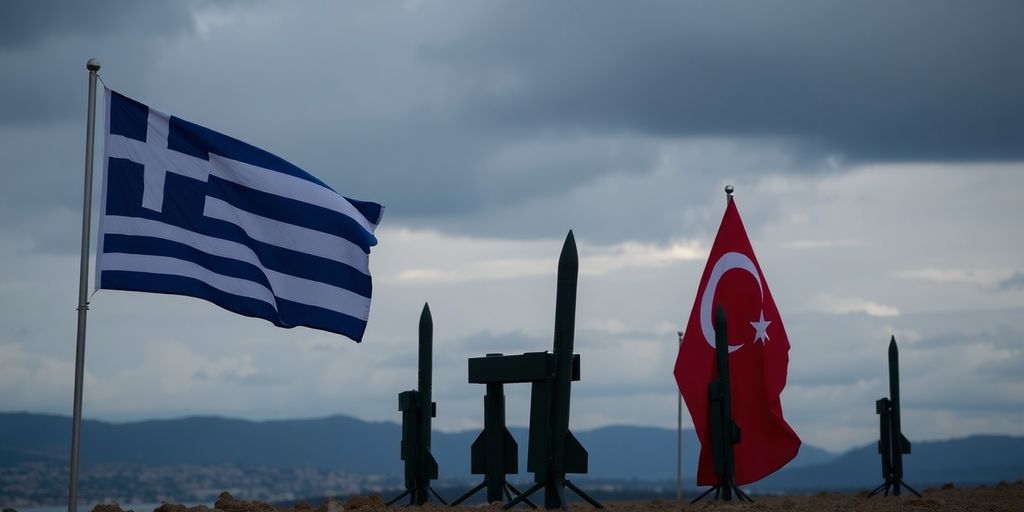Greece has expressed strong opposition to Turkey’s potential acquisition of Meteor missiles, which are reportedly being considered for sale by France. This development has sparked diplomatic tensions between Greece and Turkey, as well as concerns about the implications for regional security.
Key Takeaways
- Greece’s Defense Minister, Nikos Dendias, has formally protested to the French ambassador regarding the missile sale.
- The Meteor missile is a long-range air-to-air weapon developed by a European consortium, which includes France.
- Turkey’s interest in acquiring Eurofighter jets equipped with Meteor missiles has raised alarms in Athens, given the historical tensions between the two nations.
Diplomatic Tensions Emerge
The potential sale of Meteor missiles to Turkey has prompted Greece to take immediate diplomatic action. Defense Minister Nikos Dendias met with French Ambassador Laurence Auer to express Greece’s strong opposition to the sale. Dendias emphasized that such a transaction would be inconsistent with the excellent strategic relations that Greece and France have maintained.
In his statement, Dendias highlighted the importance of clarity regarding the missile sale, stating, "I conveyed to the French ambassador Greece’s strong opposition to such a prospect, which is incompatible with the excellent strategic relations our two countries have enjoyed until now."
The Meteor Missile
The Meteor missile, developed by MBDA, is a state-of-the-art air-to-air weapon known for its advanced capabilities. Key features include:
- Range: Over 100 kilometers
- Speed: Exceeds Mach 4
- Technology: Equipped with a ramjet motor for continuous thrust until target intercept
These features make the Meteor particularly effective against high-value targets, raising concerns in Greece about Turkey’s military capabilities if the sale proceeds.
Turkey’s Military Aspirations
Turkey’s interest in acquiring 40 Eurofighter Typhoon jets, contingent on them being equipped with Meteor missiles, has further complicated the situation. The Eurofighter jets are manufactured by a consortium that includes the UK, Germany, Italy, and Spain. However, the sale of the Meteor missiles requires approval from all member countries of the consortium, including France.
Turkey’s military ambitions have been fueled by its exclusion from the F-35 program due to its purchase of the Russian S-400 missile defense system. As a result, Turkey is seeking alternative means to bolster its air power, which has led to its interest in the Eurofighter jets and the accompanying missile systems.
Implications for Regional Security
The potential sale of Meteor missiles to Turkey poses significant implications for regional security. Greece, having recently acquired Rafale fighter jets from France, views the sale as a direct threat to its air superiority. The situation is further complicated by the mutual defense agreement between Greece and France, which includes provisions for military support in the event of an attack by a third country.
In a recent television interview, Greek Prime Minister Kyriakos Mitsotakis stated that he had not been informed of any French decision to supply the missiles to Turkey. However, he acknowledged that Turkey may have expressed interest, prompting Dendias’s proactive approach in addressing the issue with the French ambassador.
Conclusion
As Greece continues to voice its concerns over the potential sale of Meteor missiles to Turkey, the situation underscores the delicate balance of power in the region. The outcome of this diplomatic standoff will likely have lasting effects on the relationships between Greece, Turkey, and France, as well as the broader security dynamics in the Eastern Mediterranean.
Sources
- Greece strongly objects to possible French Meteor missile sale to Turkey – Turkish Minute, Turkish Minute.
- Greece Protests Turkey Wanting Meteor Missiles From France-Tied Group – The National Herald, The National Herald.
- Greeks fume at France over alleged sale of missiles to Turkey – Euractiv, Euractiv.






